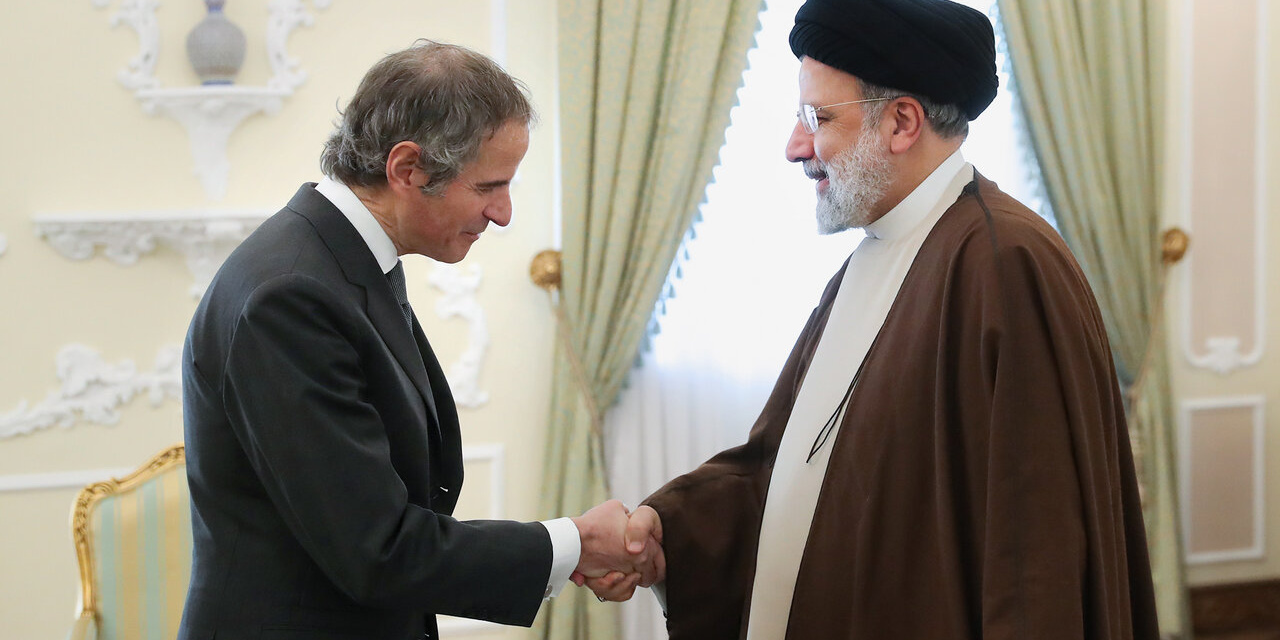Iran President Ebrahim Raisi receives International Atomic Energy Agency head Rafael Grossi, March 4, 2023
EA on BBC: A Deal to Renew Nuclear Inspections in Iran (Maybe)
UPDATE, MAR 7:
International Atomic Energy Agency head Rafael Grossi has walked back his assertion of “agreement” with Iran on renewal of nuclear inspections.
Grossi initially said that Iran had pledged to restore all cameras and surveillance equipment removed from nuclear-related sites.
However, at a Monday press conference, he said there is no agreement yet on Iran handing over video footage, confiscated since February 2021, or on future provision of footage and data: “There are certain things we need to clarify.”
Grossi downplayed public statements by Iranian officials that they will not grant access to nuclear scientists. He implied that the Iranians took a different position in private discussions.
"Why don't you let us do our job – unless you want to join us as an inspector?"
Normally serene @iaeaorg chief gets a little rattled by a fair question – stress of dealing w. Iran Atomic Energy Org will do that though. pic.twitter.com/VbsleGkVcf
— Daniel Roth (@daniel_c_roth) March 6, 2023
ORIGINAL ENTRY, MAR 5: After two days of meetings in Tehran, International Atomic Energy Agency Director General Rafael Grossi says the IAEA and Iran have jointly agreed on a number of “very concrete, very tangible” steps to restore inspections of Iranian nuclear sites.
But as soon as Grossi left the country, a senior Iranian official cast doubt on the extent of the agreement over the re-installation of the Agency’s cameras and the renewal of inspections at the underground Fordoo facility.
Grossi’s visit, which had been blocked by Iran for months, was prompted by the discovery of uranium enriched to 83.7% — close to the military grade of 90%. Tehran maintained that the particles were the result of a technical error, rather than an intentional escalation. However, Iran said it will continue to break the terms of the 2015 nuclear agreement with the production of 60% uranium.
See also UPDATES: Inspectors Find 84% Uranium — Close to Military Grade — in Iran
The IAEA is also trying to reverse a series of Iranian restrictions on inspections. Iran has denied access to sites, included three undeclared locations where uranium particles pointed to a historic nuclear program, and to personnel. In February 2021, it prevented IAEA to monitoring videos. Cameras have been removed from several locations.
Grossi: “Very Concrete” Agreements — But Iran Statements Raise Questions
At a press conference upon his return to Vienna, Grossi said:
We have agreed on a number of very concrete things.
We agreed to restore monitoring and verification capacities. We agreed that there we are going to have certain accesses. We agree on many things today.
The IAEA head explained, “Over the past few months, there was a reduction in some of the monitoring activities…related to cameras…which were not operating, so we have agreed that those will be operating again.”
He emphasized, “We are going to be agreeing on the modalities to reestablish this….This is very, very important….We have put a tourniquet on the bleeding… so now we can start…reconstructing this baseline of information.”
The spokesman for the Atomic Energy Organization of Iran, Behrouz Kamalvandi, said inspections of the underground nuclear complex in Fordoo — where the 83.7% uranium was discovered — will be increased from 8 to 11. However, he declared that there was no discussion on installing new cameras at the underground nuclear complex.
In January, Iran did not inform the IAEA of new cascades of uranium centrifuges at the Fordoo site.
Kamalvandi did not clarify the position on re-installation of cameras removed from other sites.
The spokesman also said there was no discussion on access to individuals.
Meeting Grossi, Iranian President Ebrahim Raisi said the visit showed the “firm determination to have constructive cooperation with the agency”. But he then set up the pretext for withdrawal from any agreement, declaring that Iran “expects the approach of the Agency’s activities in Iran to be completely professional and avoiding being influenced by domineering powers”.
Tehran has used the claim that the Agency is captive to other countries, notably the US and Israel, to justify its limits on inspections since early 2021.
An IAEA Meeting on Monday
Despite the lack of clarity on outcome, Grossi’s trip may have been enough to stave off another IAEA censure of Iran.
The IAEA Board of Governors convenes on Monday, and the US and European powers were discussing a possible resolution over the discovery of the 84.7% uranium.
In November, the IAEA Board censured Iran over its lack of cooperation.
Grossi said in his Vienna press conference on Saturday:
I think we are taking steps in the right direction. I don’t want to sound overly optimistic or overly pessimistic. I think it’s hard work ahead of us, a lot of work ahead of us, for Iran and for us….
All of this requires a lot of time, requires painstaking efforts on the parts of my inspectors and also their Iranian counterparts’ parts and reconciling figures, looking at the information.
These have been lost.
He said an IAEA team will be in Iran “in the next few days to arrange more technical specifics”.


Iranian rial continues to recover against the dollar: https://www.bonbast.com/
Mass privatization scheme will give investors an alternative to buying gold and foreign currency: https://financialtribune.com/articles/business-and-markets/117370/govt-to-sell-shares-in-steel-petrochem-giants